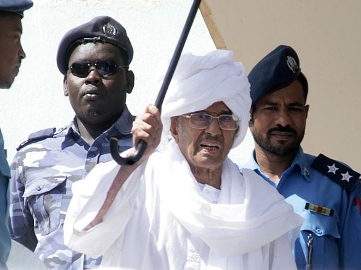Sudanese security arrests opposition leaders as protests continue
December 22, 2018 (KHARTOUM) – The National Intelligence and Security Services (NISS) on Saturday has arrested the chairman of the opposition umbrella National Consensus Forces (NCF) Farouq Abu Issa and 13 members of the alliance.

It pointed out that the detainees include Farouq Abu Issa, Wagdi Salih Abdu, Satie Al-Hag, Tariq Abdel-Majeed, Amani Idris, Abdel-Muni’im Mohamed al-Amin, Muneerah Sayed, Hytham Taj al-Sir, Rabei Bakri, Abdallah Al-Hadi, Hanan Mohamed, Tariq Kandaik, Abu Al-Gasim Babiker and Faisal al-Rasheed.
According to the bulletin, the meeting has discussed ways to escalate the popular protests denouncing the deteriorating living conditions and calling to overthrow the regime of President Omer al-Bashir.
Meanwhile, the ABP said the meeting has decided to kick off the general political strike and civil disobedience on Wednesday.
Since Wednesday, different Sudanese cities witnessed spontaneous demonstrations across the country denouncing the price hikes and demanding the removal of the regime.
Several protesters were killed and dozens injured by the riot police and the NISS as the government has accused Israeli-recruited opposition elements of triggering the demonstrations.
CONTINUED PROTESTS
Meanwhile, protests have continued on Saturday in a number of towns across Sudan.
Eyewitnesses said students protesting in the town of al-Rahad, North Kordofan State, set fire to the ruling National Congress Party’s (NCP) headquarters and other official buildings.
Also, there were unconfirmed reports that the house of the governor of North Kordofan Ahmed Haroun was set on fire on Saturday evening.
Protesters also gathered in several neighbourhoods of the capital, Khartoum and in the city of Madani, Gezira State.
Following the release of the 2018 budget last January, peaceful protests erupted in a number of Sudanese states leading to the killing of a high school student in West Darfur State and detention of dozens of opposition activists across the country.
To quell anti-austerity protests in Khartoum, Sudanese security forces in September 2013 carried out a brutal crackdown on the peaceful demonstration, killing nearly two hundred protesters say human rights groups or 86 people according to government figures.
Opposition forces attribute the deteriorating living condition and economic meltdown to corruption, lack of production policies, and lack of economic reform vision following the secession of South Sudan.
Sudan lost 75% of its oil reserves after the southern part of the country became an independent nation in July 2011, denying the north billions of dollars in revenues. Oil revenue constituted more than half of Sudan’s revenue and 90% of its exports.
(ST)
